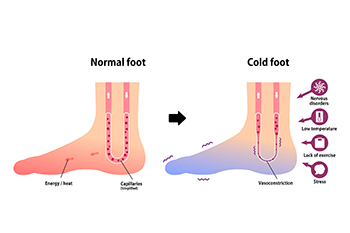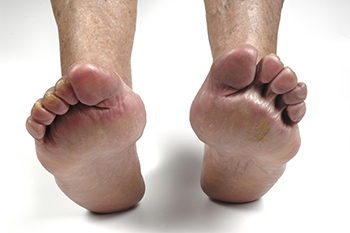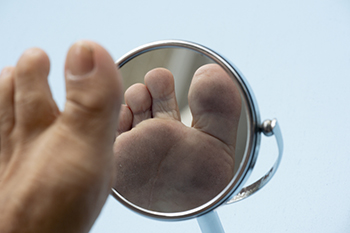

Finding the cause of cold feet is important for both comfort and overall health. While environmental factors may contribute to occasional coldness in the extremities, persistent cold feet could indicate underlying issues. One major issue is poor circulation, often linked to heart conditions, sedentary lifestyles, or smoking. Iron-deficiency anemia is another common cause of cold feet, necessitating dietary changes and supplementation. Diabetes, particularly types 1 and 2, can lead to cold feet from nerve damage, underscoring the importance of blood sugar management. Further, hypothyroidism, peripheral vascular disease, Raynaud’s phenomenon, and arteriosclerosis can all contribute to cold feet. If you are experiencing recurrent cold feet or associated symptoms, like numbness or tingling, it's suggested that you make an appointment with a podiatrist for an evaluation, diagnosis, and treatment options.
While poor circulation itself isn’t a condition; it is a symptom of another underlying health condition you may have. If you have any concerns with poor circulation in your feet contact Dale Delaney, DPM of InStride Kinston Podiatry Center. Our doctor will treat your foot and ankle needs.
Poor Circulation in the Feet
Peripheral artery disease (PAD) can potentially lead to poor circulation in the lower extremities. PAD is a condition that causes the blood vessels and arteries to narrow. In a linked condition called atherosclerosis, the arteries stiffen up due to a buildup of plaque in the arteries and blood vessels. These two conditions can cause a decrease in the amount of blood that flows to your extremities, therefore resulting in pain.
Symptoms
Some of the most common symptoms of poor circulation are:
Treatment for poor circulation often depends on the underlying condition that causes it. Methods for treatment may include insulin for diabetes, special exercise programs, surgery for varicose veins, or compression socks for swollen legs.
As always, see a podiatrist as he or she will assist in finding a regimen that suits you. A podiatrist can also prescribe you any needed medication.
If you have any questions, please feel free to contact our office located in Kinston, NC . We offer the newest diagnostic and treatment technologies for all your foot care needs.

Foot pain is often one of the earliest signs of rheumatoid arthritis, or RA, an autoimmune condition affecting joints. RA can manifest in various forms in the feet, including swelling, stiffness, and tenderness. Over time, untreated RA can lead to progressive foot deformities such as bunions, hammertoes, and rheumatoid nodules. Additionally, inflammation in the joints can cause joint erosion and instability, further exacerbating foot problems. Seeking care from a podiatrist is necessary for individuals with RA, as these doctors specialize in managing foot conditions associated with arthritis. Podiatrists can provide comprehensive assessments, including gait analysis and imaging studies, to identify specific foot issues related to RA. If you suffer from RA symptoms in your feet, it is strongly suggested that you are under the care of a podiatrist who can help you maintain mobility and a better quality of life.
Because RA affects more than just your joints, including the joints in your feet and ankles, it is important to seek early diagnosis from your podiatrist if you feel like the pain in your feet might be caused by RA. For more information, contact Dale Delaney, DPM of InStride Kinston Podiatry Center. Our doctor will assist you with all of your podiatric concerns.
What Is Rheumatoid Arthritis?
Rheumatoid Arthritis (RA) is an autoimmune disorder in which the body’s own immune system attacks the membranes surrounding the joints. Inflammation of the lining and eventually the destruction of the joint’s cartilage and bone occur, causing severe pain and immobility.
Rheumatoid Arthritis of the Feet
Although RA usually attacks multiple bones and joints throughout the entire body, almost 90 percent of cases result in pain in the foot or ankle area.
Symptoms
Diagnosis
Quick diagnosis of RA in the feet is important so that the podiatrist can treat the area effectively. Your doctor will ask you about your medical history, occupation, and lifestyle to determine the origin of the condition. Rheumatoid Factor tests help to determine if someone is affected by the disease.
If you have any questions please feel free to contact our office located in Kinston, NC . We offer the newest diagnostic and treatment technologies for all your foot and ankle needs.

Your feet contain one-fourth of the bones in the body, as well as a complex structure of muscles, ligaments, tendons, and joints. It's not uncommon for one or several of these components to be in pain. If you are physically active, the chances of incurring a foot injury or other condition are even higher. It is sometimes necessary to seek medical help from a podiatrist with foot, toe, or ankle pain. Beyond just examining your feet, a podiatrist conducts a thorough assessment of your gait to understand how foot issues might be affecting other parts of your body. With expertise in foot and lower limb structure and movement, a podiatrist can diagnose foot conditions, identify underlying health issues, such as diabetes or arthritis, and tailor treatment plans accordingly. If you're experiencing foot pain, skin or nail abnormalities, foot injuries, or broader health concerns like diabetes, it may be time to visit a podiatrist. Your feet deserve the best care possible. It is suggested that you make an appointment with a podiatrist today to address any foot pain or other related concerns you may have.
If you are dealing with pain in your feet and ankles, you may want to seek help from a podiatrist. Feel free to contact Dale Delaney, DPM from InStride Kinston Podiatry Center. Our doctor can provide the care you need to keep you pain-free and on your feet.
What Is a Podiatrist?
A podiatrist is a doctor of podiatric medicine who diagnoses and treats conditions of the foot, ankle, and related structures of the leg. Your podiatrist may specialize in a certain field such as sports medicine, wound care, pediatrics, and diabetic care. Podiatrists have the ability to become board certified through training, clinical experience, and then taking an exam.
What Do Podiatrists Do?
On a daily basis, a podiatrist may perform the following activities:
It is very important that you take care of your feet. It’s easy to take having healthy feet for granted, however foot problems tend to be among the most common health conditions. Podiatrists can help diagnose and treat a variety of feet related conditions, so it is crucial that you visit one if you need assistance.
If you have any questions please feel free to contact our office located in Kinston, NC . We offer the newest diagnostic and treatment technologies for all your foot and ankle needs.

Sometimes, it can be tricky when different health issues overlap, such as when a diabetic patient gets foot sores from diabetes, pressure, or both. In such cases, podiatrists need to make sure patients get care that deals with the cause of the sore. For example, a diabetic individual might have a foot sore from pressure or friction, which would likely require different treatment than a foot sore caused by nerve damage or poor circulation. If you have diabetes, it is strongly suggested that you schedule regular appointments with a podiatrist. This foot doctor can routinely examine your feet and administer proper treatment depending on the diagnosis. These types of exams will include checking blood flow, making sure your shoes are not causing foot problems, and caring for wounds as needed.
Wound care is an important part in dealing with diabetes. If you have diabetes and a foot wound or would like more information about wound care for diabetics, consult with Dale Delaney, DPM from InStride Kinston Podiatry Center. Our doctor will assess your condition and provide you with quality foot and ankle treatment.
What Is Wound Care?
Wound care is the practice of taking proper care of a wound. This can range from the smallest to the largest of wounds. While everyone can benefit from proper wound care, it is much more important for diabetics. Diabetics often suffer from poor blood circulation which causes wounds to heal much slower than they would in a non-diabetic.
What Is the Importance of Wound Care?
While it may not seem apparent with small ulcers on the foot, for diabetics, any size ulcer can become infected. Diabetics often also suffer from neuropathy, or nerve loss. This means they might not even feel when they have an ulcer on their foot. If the wound becomes severely infected, amputation may be necessary. Therefore, it is of the upmost importance to properly care for any and all foot wounds.
How to Care for Wounds
The best way to care for foot wounds is to prevent them. For diabetics, this means daily inspections of the feet for any signs of abnormalities or ulcers. It is also recommended to see a podiatrist several times a year for a foot inspection. If you do have an ulcer, run the wound under water to clear dirt from the wound; then apply antibiotic ointment to the wound and cover with a bandage. Bandages should be changed daily and keeping pressure off the wound is smart. It is advised to see a podiatrist, who can keep an eye on it.
If you have any questions, please feel free to contact our office located in Kinston, NC . We offer the newest diagnostic and treatment technologies for all your foot care needs.